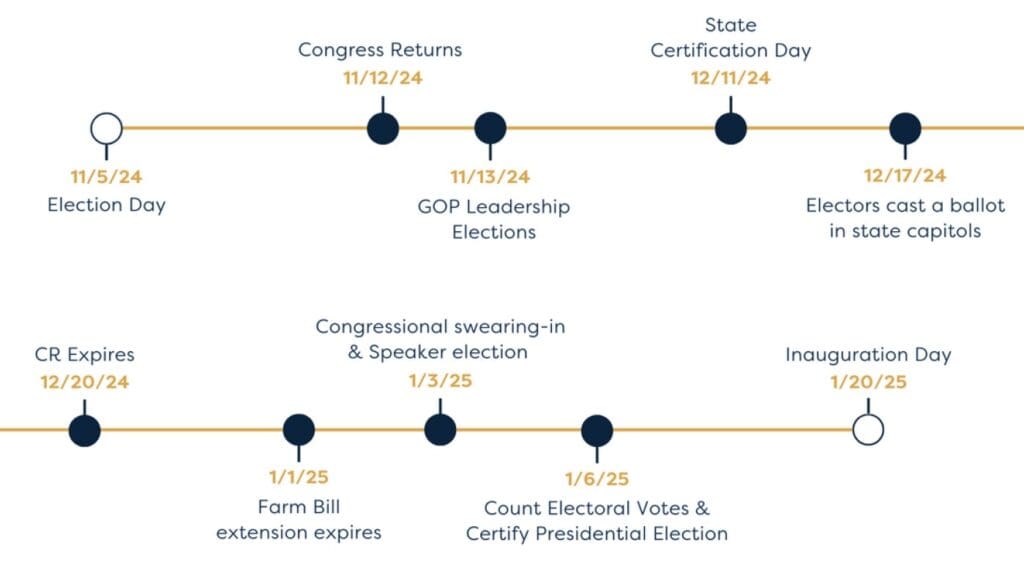November 6, 2024 – 2:00 PM ET
All results from the Associated Press
SNAPSHOT
President Donald Trump decidedly won the presidency, clearing the hurdle of 270 electoral votes early Wednesday morning. Of the swing states, President Trump won Georgia, Michigan, North Carolina, Pennsylvania, and Wisconsin. The races in Arizona and Nevada have not yet been called.
Trump will return to the oval office with a Republican Senate majority. So far, Republicans have secured 52 Senate seats by flipping West Virginia, Ohio, and Montana from Democrat to Republican. Maine, Pennsylvania, Arizona, and Nevada have yet to be called.
However, the House majority has not yet been decided. Of the 435 House of Representatives’ seats, 380 have been called, with a breakdown of 201 Republican seats and 182 Democrat held seats. With a number of close races yet to be called, it may take weeks to determine the final results.
Notably for the food and agriculture sectors, Trump has said he will focus on tax policy, immigration, the imposition of broad tariffs, and regulatory shifts on food, agriculture, and health policy. Whether he has unified party control will determine the depth of such policy changes.
PRESIDENTIAL ELECTION
Bucking against the trend of the 2016 and 2020 presidential election cycles, a winner was declared relatively early – by 6:00 a.m. ET on Wednesday, November 6, when Pennsylvania was called for the former President. On his path to victory, Trump was able to flip Georgia, Pennsylvania and Wisconsin from Biden in 2020, with the possibility that other swing states could follow.
As of 2:00 p.m. ET on Wednesday, November 6, Trump has claimed 292 electoral votes with Vice President Kamala Harris at 224. Alaska, Arizona, Maine, and Nevada remain to be called, though all but Maine are leaning towards Trump. In the early hours of Wednesday morning, the 47th President-elect greeted an audience in Florida claiming victory for the “MAGA movement,” describing the Republican wins in the House and Senate races as a “powerful mandate” from the American people, while noting that “it’s time to put the divisions of the past four years behind us.”
HOUSE
In the current Congress, Republicans control the House of Representatives with a 220-212 breakdown and three vacancies. All 435 House seats were up for reelection. In order to win back the House, Democrats will need to flip four seats.
Going into election night, the House was considered a toss-up, with a number of highly competitive seats being the deciding factors. As results started to roll in through the evening hours on November 5, 2024, that sentiment proved to be true, and many of the most competitive races are still not called.
House control remains unknown, although the numbers are close and in favor of Republicans. Republicans current won 201 seats and Democrats have 184 seats. There are still 50 seats to be called.
SENATE
Prior to election day, Senate Democrats and aligned Independents held a slim 51-49 majority in the 118th Congress. Of the 34 Senate seats slated for election, 19 were held by Democrats, 11 by Republicans and 4 by Independents. Early analysis gave Republicans the edge to take over the chamber, expected to most likely flip the seats for retiring Sen. Joe Manchin (I-WV) and incumbent Jon Tester (D-MT).
Currently, three Senate seats in Ohio, West Virginia, and Montana have been called for the Republican candidate, giving the party control of the chamber. Several other races in Arizona, Maine, Michigan, Nevada, Pennsylvania remain too close to call; however, the outcome of these races will not change Republican control of the chamber. Out of these races, Maine is the outlier and the delay in announcing the outcome due to the Maine ranked-choice voting system.
AGRICULTURE COMMITTEE CHANGES
On the Senate Agriculture Committee, Sen. Sherrod Brown (D-OH) lost his race to Republican candidate, Ohio businessman, Bernie Moreno. The Michigan seat left open with the retirement of Senate Agriculture Committee Chair Sen. Debbie Stabenow (D-MI), remains too close to call, with Rep. Elissa Slotkin (D-MI-07) and former Rep. Mike Rogers (R-MI-08) in a dead heat. Sen. Deb Fischer (R-NE) fought off Independent challengers, Dan Osborn, to hold on to her seat in one of the only competitive Republican-incumbent races of this cycle. Senator Mike Braun (R-IN) also won his bid for Governor and will be replaced in the Senate by Rep. Jim Banks (R-IN-03).
Current Ranking Member Sen. John Boozman (R-AR) is poised to take control of the Senate Agriculture Committee as chair for the 119th Congress. Sen. Amy Klobuchar (D-MN) is expected to take over as the leading Democrat on the committee.
Members of the House Agriculture Committee largely kept their seats during the 2024 election. The majority of the tight agriculture committee races on both sides of the aisle resulted in reelection of incumbents, and in those uncalled raced, most incumbents are winning. One notable exception is Rep. Marc Molinaro (R-NY-19) who lost his seat to Democratic challenger, Josh Riley. Rep. Lori Chavez-DeRemer (R-OR-05) is currently behind in her race with 69% of the votes recorded, and Rep. Andrea Salinas (D-OR-06) is currently behind in her race with 66% of the votes recorded.
On the Democratic side of the aisle, many incumbents are winning or have already won. Of the open seats left vacant, the seat formerly held by Rep. Elissa Slotkin (D-MI-07) has been flipped by Republican candidate Tom Barrett. In Virginia, Democratic candidate Eugene Vindman is leading the race to replace former Rep. Abigail Spanberger (D-VA-07). Of the four Democrats who voted for the House farm bill, Rep. Sanford Bishop (D-GA-02) and Rep. Eric Sorenson (D-IL-17) have won their reelection and Rep. Don Davis (D-NC-01) and Rep. Yadira Caraveo (D-CO-08), are leading their raced by a small margin.
Leadership of the House Agriculture Committee is still up in the air until party control of the chamber been determined. Rep. GT Thompson (R-PA-15) and Rep. David Scott (D-GA-13) are the sitting leaders of the committee going into the 119th Congress, and both have won their reelection bids.

KEY DATES & WHAT’S NEXT
As the 2024 U.S. election unfolds, a series of critical dates and procedural deadlines will shape the course of the coming weeks.

On November 12, lawmakers will return to Capitol Hill with a combined 20 days on the legislative calendar and multiple pieces of must-pass legislation to consider during the “lame duck” period. On November 13, elections for the House and Senate Republican leadership are set to occur, although timing could change if completed election results are not available by then. Democrats have yet to announce the dates of their leadership elections. Results of these elections could have significant implications for the legislative agenda in the post-election period.
The process for certifying the election results will also be a focal point in December. A new national deadline will require governors to certify the results of the presidential election and submit their slate of electors on December 11, with expedited procedures in place to handle disputes in light of on going litigation surrounding the 2020 election. Later, on December 17, electors in all states will formally cast their ballots for president and vice president. As with previous election cycles, official in swing states are bracing for potential disruptions, including unrest and possible submission of alternate electors, particularly if legal or procedural challenges arise.
Back at the Capitol, the December 20 expiration of the current Continuing Resolution (CR) and the January 1 expiration of the current farm bill extension will add to the potential for legislative gridlock during the lame duck Congress. In addition, Congress faces a number of other expiring reauthorizations and hurdles they must complete before the adjournment of the 118th Congress, including the National Defense Authorization Act (NDAA), FY25 appropriations, and a possible disaster assistance package.
At noon on January 3, 2025, the 119th Congress will convene for the first order of business, electing a Speaker of the House. Following the election of a Speaker, House members will take the oath of office and be sworn in. Finally, on January 6, 2025, the new Congress will count and certify the votes of the Electoral College, concluding the 2024 election cycle. While objections to the results remain possible, the law now makes it more difficult for these challenges to derail the certification process.
Download a pdf of the Torrey Advisory Group Election Report.
